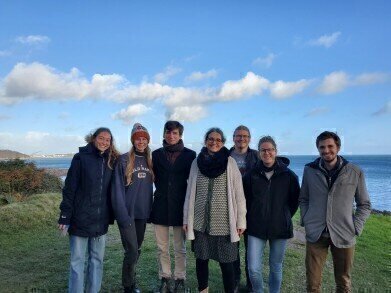-
 Stineke van Houte and research team
Stineke van Houte and research team
News & Views
Bacterial Defences Investigations win ERC Starting Grant
Jan 17 2022
To further our understanding of the movement of DNA between bacteria, researchers at the University of Exeter are undertaking a major project to investigate how the spread of these mobile genetic elements (MGEs) are influenced by bacterial defences.
MGEs, which can change key traits of bacteria such as antibiotic resistance and virulence (the severity of illness they can cause), can be seen in various forms including phages (viruses that infect bacteria) and plasmids (circular DNA molecules).
Dr Stineke Van Houte, at the University’s Environment and sustainability Institute has been awarded a €1.5 million European Research Council (ERC) Starting Grant for the project, called MUSIC (MGE Uptake and Spread in Microbial Communities), with a further €1 million for a Fluorescence-activated cell sorting (FACS) machine.
"This MUSIC project aims to understand how bacterial immune systems keep MGEs out," said Dr Van Houte, "It will investigate the relative importance of the different individual bacterial defences, using a combination of bacterial genome sequence analyses and laboratory experiments.
"The goal is to develop a comprehensive picture of which bacterial defences are particularly important in blocking MGE infections, and this information will allow us to predict whether a bacterium can or can’t become infected with an MGE, based solely on the defence repertoire found in that bacterium’s genome.
"From this, we will use machine learning approaches in order to build towards understanding how MGEs spread through communities of multiple bacterial species, based on the knowledge of what defences exist in that community."
The project's "blue sky" approach was not specifically focussed on human health – but on understanding key processes of bacterial evolution, he added. However, this understanding could be vital in the emerging antibiotic resistance crisis.
The award to Dr Van Houte, one of 397 ERC Starting Grants given to early-career researchers, from a total of €619 million awarded, are intended to help "ambitious younger researchers launch their own projects, form their teams and pursue their best ideas".
ERC president Professor Maria Leptin said: "Letting young talent thrive in Europe and go after their most innovative ideas – this is the best investment in our future, not least with the ever-growing competition globally.
"We must trust the young and their insights into what areas will be important tomorrow. So, I am thrilled to see these new ERC Starting Grant winners ready to cut new ground and set up their own teams."
More information online
Digital Edition
ILM 49.5 July
July 2024
Chromatography Articles - Understanding PFAS: Analysis and Implications Mass Spectrometry & Spectroscopy Articles - MS detection of Alzheimer’s blood-based biomarkers LIMS - Essent...
View all digital editions
Events
Jul 28 2024 San Diego, CA USA
Jul 30 2024 Jakarta, Indonesia
Jul 31 2024 Chengdu, China
ACS National Meeting - Fall 2024
Aug 18 2024 Denver, CO, USA
Aug 25 2024 Copenhagen, Denmark

.jpg)

24_06.jpg)













